As we step into 2024, businesses find themselves at the crossroads of innovation and efficiency, seeking the most adept solutions to navigate the intricacies of the ever-evolving marketing landscape. Marketing automation platforms stand as the guiding beacons, offering a spectrum of tools designed to streamline processes, elevate customer engagement, and ultimately drive results. In this exploration, we delve into the year’s most influential players, unveiling the eight best marketing automation platforms poised to shape the trajectory of businesses in 2024. From comprehensive suites to specialized tools, each platform contributes a unique facet to the mosaic of marketing success.
What is a marketing automation platform?
A marketing automation platform is a comprehensive software solution designed to facilitate, streamline, and automate various aspects of a company’s marketing efforts across multiple channels. These platforms empower businesses to execute targeted and personalized marketing campaigns, nurture leads, and analyze data for informed decision-making.
What can marketing automation do for your business?
Marketing automation serves as a dynamic catalyst for businesses, offering a multitude of benefits that can significantly enhance overall efficiency, customer engagement, and ultimately, drive sustainable growth.
Here’s a breakdown of what marketing automation can do for your business:
- Efficiency and Time Savings: Marketing automation streamlines repetitive tasks such as email campaigns, social media posting, and lead nurturing. By automating these processes, your team can focus on strategic initiatives, creative endeavors, and high-priority tasks, leading to increased productivity and efficiency.
- Lead Generation and Nurturing: Automation platforms excel in lead management, helping businesses capture, categorize, and nurture leads effectively. Through automated workflows, personalized content, and timely follow-ups, businesses can guide leads through the sales funnel, increasing the likelihood of conversion.
- Personalization: Automation allows businesses to deliver personalized content and messages based on customer behavior, preferences, and demographics. This enhances the customer experience and increases engagement.
- Scalability: As your business grows, managing marketing tasks manually becomes challenging. Marketing automation scales with your business, making it easier to handle larger audiences and more complex campaigns.
Marketing automation can revolutionize the way businesses approach their marketing efforts, bringing about increased efficiency, improved customer engagement, and better overall results.
8 Best Marketing Automation Platforms for Your Business in 2024
To help you navigate the options, we’ve compiled a list of the 8 best marketing automation platforms for your business this year.
1. HubSpot
HubSpot remains a powerhouse in the marketing automation arena. Known for its user-friendly interface, HubSpot offers a comprehensive suite of tools for lead generation, email marketing, and customer relationship management. Its robust analytics provide valuable insights to refine your marketing strategy.
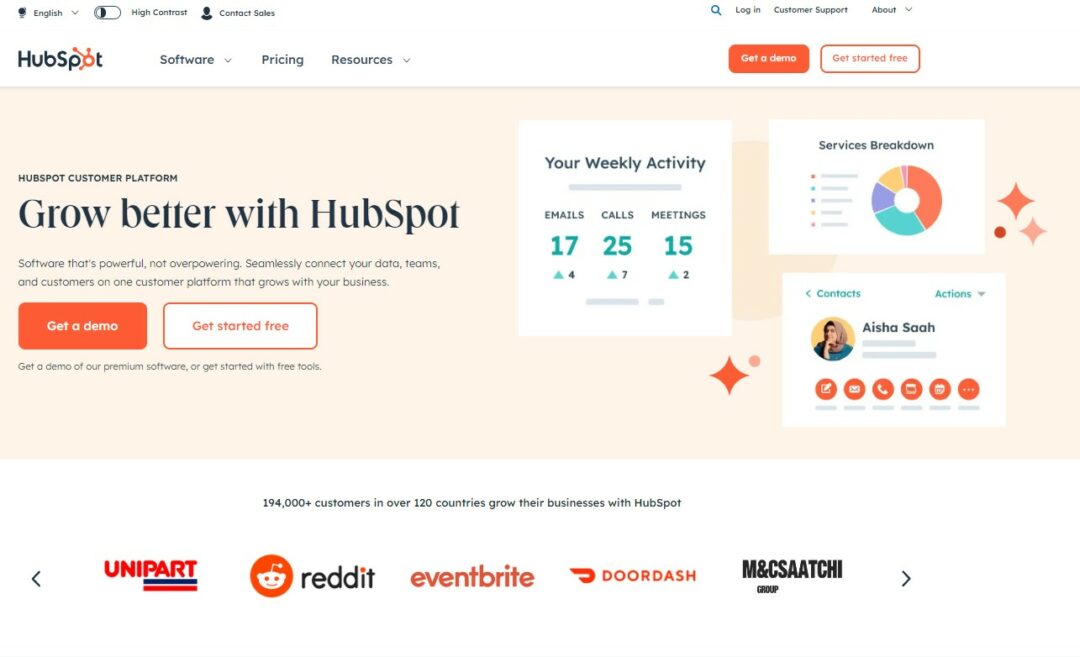
Pros:
- Extensive set of marketing tools, seamless integration with other business applications, and a vibrant community for support and knowledge sharing.
- HubSpot’s CRM, which is available for free, facilitates efficient lead management and collaboration between sales and marketing teams.
Cons:
- Some users may find the pricing structure relatively higher compared to other solutions, especially for advanced features.
- Customization options in certain areas may be limited for businesses with highly specific requirements.
Pricing:
Starting at $800 per month.
The platform’s drag-and-drop functionality simplifies the creation of automation workflows, while its intuitive dashboard provides a centralized hub for monitoring campaigns, analyzing performance metrics, and managing customer relationships. HubSpot’s commitment to user experience is evident in its continuous updates and improvements, ensuring that users can navigate the platform with ease. HubSpot excels in providing a holistic view of customer interactions, allowing businesses to tailor their strategies based on detailed insights.
2. Marketo by Adobe
Marketo, now part of Adobe, is a sophisticated platform suitable for enterprise-level businesses. It excels in lead management, allowing for personalized engagement at every stage of the customer journey. With advanced analytics and AI-driven capabilities, Marketo empowers businesses to deliver targeted and impactful campaigns.
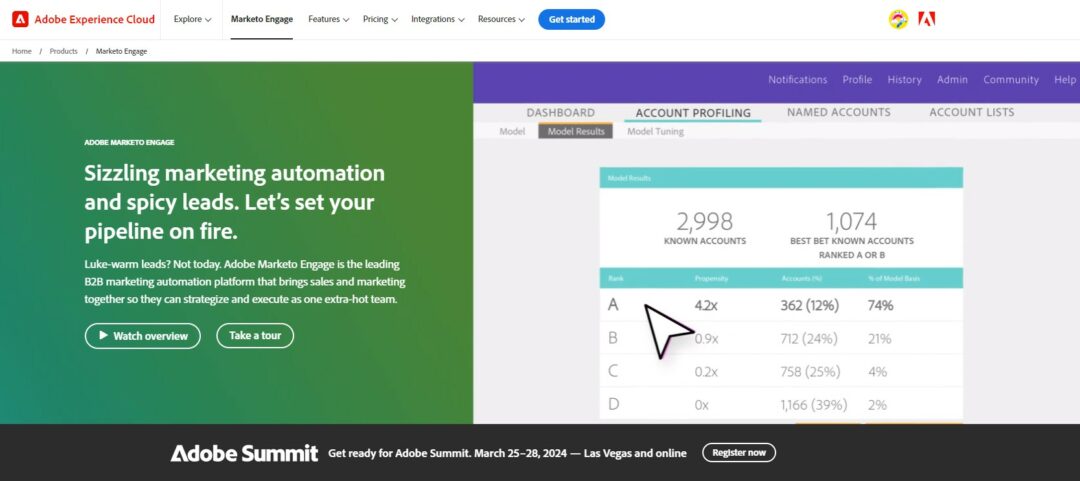
Pros:
- Its ability to seamlessly integrate with Adobe’s broader ecosystem, providing users with a unified platform for end-to-end marketing operations.
- The platform’s user interface is sleek and intuitive, catering to the needs of marketers with varying levels of expertise.
- The drag-and-drop functionality makes campaign creation and execution a seamless process, allowing users to navigate through intricate marketing workflows effortlessly.
- Comprehensive Lead Management: Marketo excels in providing a robust lead management system, allowing businesses to effectively nurture leads throughout the entire customer journey.
- Advanced Analytics and Reporting: Marketo offers powerful analytics tools, providing in-depth insights into campaign performance.
Cons:
- Cost Consideration: Marketo is often perceived as a higher-cost solution, particularly for smaller businesses or those with more straightforward marketing needs. While its features justify the expense for enterprises with complex requirements, the cost factor may be a drawback for businesses on a tighter budget.
- Complexity for Beginners: Marketo’s extensive range of features and capabilities can be overwhelming for users who are new to marketing automation. The platform’s complexity may pose a challenge for beginners, requiring a learning curve before users can fully leverage its capabilities.
- Complexity for Beginners: Marketo’s extensive range of features and capabilities can be overwhelming for users who are new to marketing automation. The platform’s complexity may pose a challenge for beginners, requiring a learning curve before users can fully leverage its capabilities.
- Integration Challenges: While Marketo integrates seamlessly with Adobe’s broader ecosystem, integration with other third-party tools and platforms may not be as straightforward. This could potentially limit flexibility for businesses relying on a diverse set of marketing and business applications.
- Limited Native Social Media Integration: Businesses heavily focused on social media marketing may find that dedicated tools offer more comprehensive solutions in this specific area.
Pricing:
Starting at $895 per month
3. ActiveCampaign
ActiveCampaign stands out for its powerful automation features combined with an affordable pricing structure. This platform provides a unified solution for email marketing, automation, sales automation, and customer relationship management. It’s an excellent choice for small to mid-sized businesses looking to scale their marketing efforts.
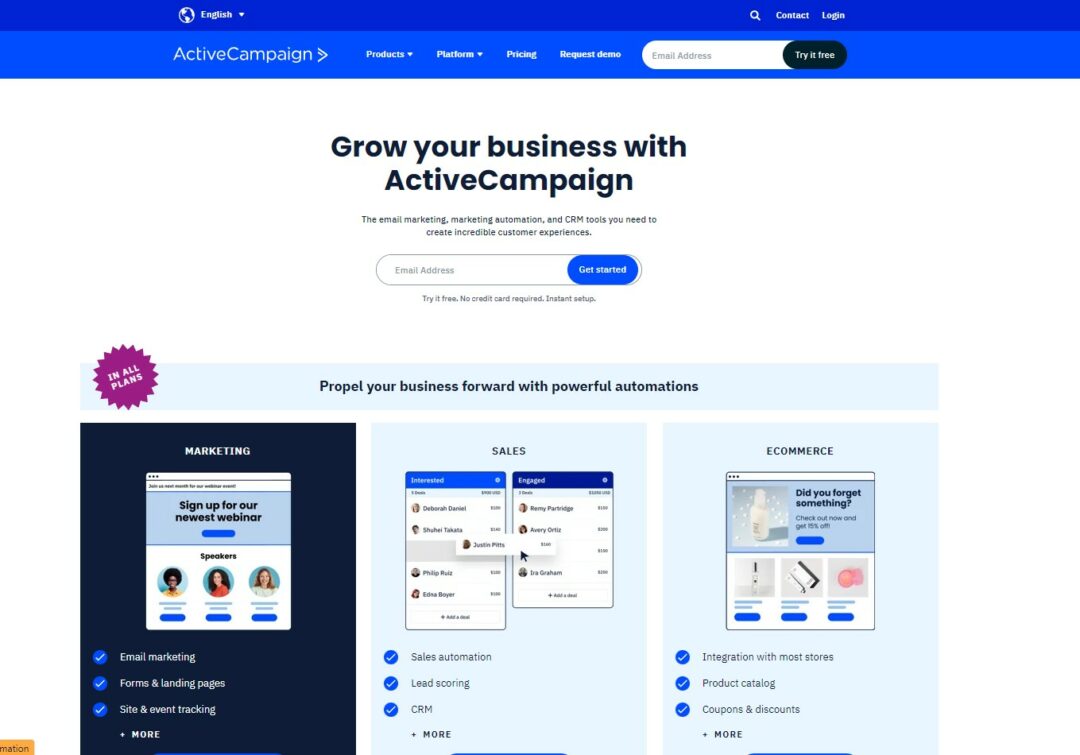
Pros:
- All-in-One Solution: ActiveCampaign offers a comprehensive suite of tools, combining email marketing, automation, sales automation, and customer relationship management (CRM) in one platform.
- Affordability: Particularly appealing to small and mid-sized businesses, ActiveCampaign provides robust features at a competitive price point. This affordability makes it accessible to a wide range of businesses looking to leverage advanced marketing automation without a hefty price tag.
- User-Friendly Interface: ActiveCampaign features an intuitive and user-friendly interface. The platform’s design simplifies navigation, and the drag-and-drop automation builder makes it easy for users to create and execute complex workflows without requiring extensive technical expertise.
- Extensive Integrations: ActiveCampaign offers a wide range of integrations with third-party applications. This flexibility allows businesses to connect the platform with other tools and systems, expanding its functionality and adaptability to specific business needs.
Cons:
- Learning Curve: For users new to marketing automation, ActiveCampaign may pose a steeper learning curve. The platform’s advanced features and capabilities may take some time to master, especially for those unfamiliar with automation concepts.
- Email Builder Flexibility: While ActiveCampaign’s email builder is versatile, some users may find it slightly less flexible compared to other dedicated email marketing platforms. Users seeking highly customized email templates may encounter limitations in design options.
- Limited Native Integrations: Although ActiveCampaign supports a variety of integrations with third-party applications, some users have noted that the platform has fewer native integrations compared to some competitors.
- Occasional Interface Lag: Some users have reported occasional interface lag or delays in the platform’s responsiveness. While these instances might be infrequent and generally don’t severely impact user experience, they are worth noting for businesses with a preference for swift and seamless interactions.
Pricing:
Starting at $49 per month.
The platform seamlessly integrates email marketing, automation, sales automation, and customer relationship management, providing a unified solution for streamlined operations. ActiveCampaign’s user interface is intuitive and user-friendly, making it accessible even for those new to marketing automation. The drag-and-drop automation builder simplifies the process of creating complex workflows, allowing marketers to design and execute campaigns with ease.
4. Pardot by Salesforce
Pardot, a Salesforce product, is tailored for B2B marketing automation. It seamlessly integrates with Salesforce CRM, offering a unified platform for sales and marketing teams. Pardot’s lead nurturing capabilities, along with in-depth analytics, make it a top choice for businesses focusing on high-quality lead generation.
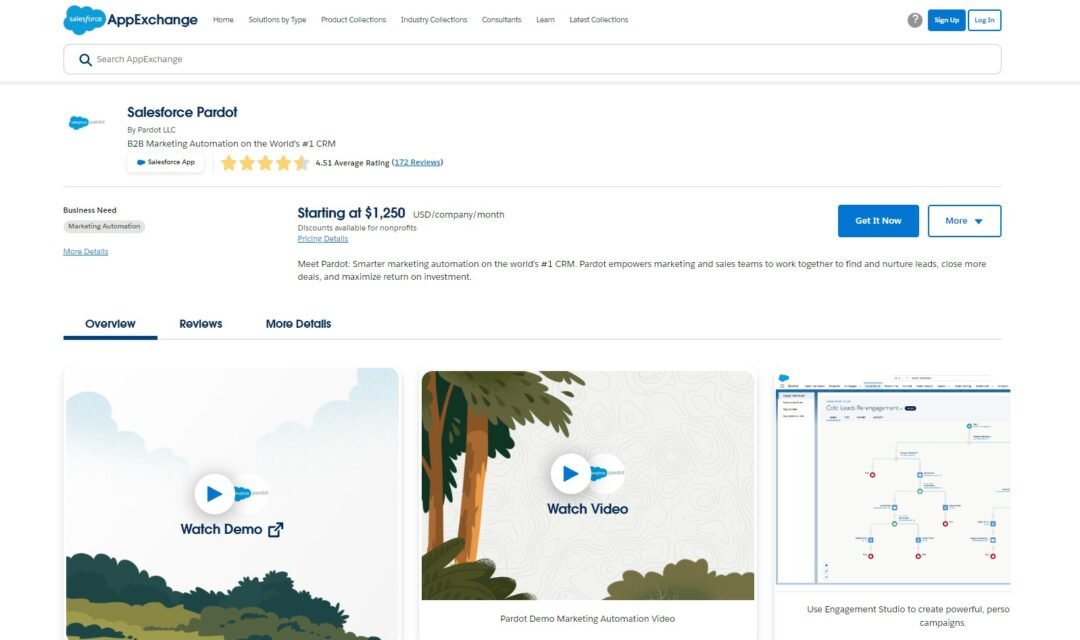
Pros:
- Seamless Salesforce Integration: Pardot’s tight integration with Salesforce is a significant advantage for businesses already utilizing Salesforce CRM. The seamless connection ensures a unified platform for both marketing and sales teams, facilitating collaboration and data synchronization.
- Robust Lead Management: The platform’s lead nurturing capabilities help in guiding leads through the sales funnel with personalized and targeted content, increasing the likelihood of conversion.
- Advanced Analytics and Reporting: Users can track key metrics, assess the effectiveness of various strategies, and make data-driven decisions to optimize their marketing efforts.
- Social Media Integration: Users can track social interactions, monitor trends, and incorporate social data into lead scoring and segmentation, enhancing the overall understanding of customer behavior.
Cons:
- Complex Implementation: Setting up Pardot and ensuring seamless alignment with Salesforce may require technical expertise, and users may face a steeper learning curve, particularly if they are new to Salesforce.
- Higher Cost for Small Businesses: Pardot is often considered more suitable for larger enterprises due to its advanced features and capabilities.
- Dependency on Salesforce CRM: The platform’s functionalities are tightly linked to Salesforce, and businesses using alternative CRM systems might not experience seamless integration.
Pricing:
Pardot pricing starts at $1,250 per month.
Its seamless integration with Salesforce CRM ensures a unified experience for sales and marketing teams, fostering collaboration and efficiency. The platform offers advanced lead nurturing tools, enabling businesses to engage prospects with relevant content and automating repetitive tasks to save time and resources.
5. Mailchimp
While traditionally recognized for email marketing, Mailchimp has evolved into a robust marketing automation platform. Its user-friendly interface, combined with features like customer journey mapping and audience segmentation, makes it an excellent choice for small businesses and startups.
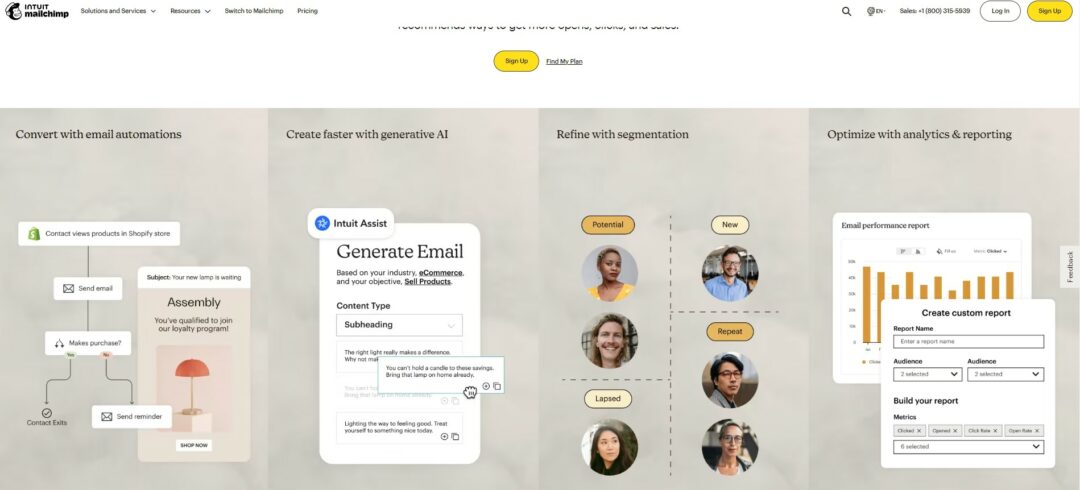
Pros:
- User-Friendly Interface: One of Mailchimp’s standout advantages is its user-friendly interface. The platform’s intuitive design makes it easy for marketers to navigate, create campaigns, and analyze performance without a steep learning curve.
- Advanced Analytics: Mailchimp provides robust analytics tools that empower marketers with valuable insights.
- Automation Features: Mailchimp’s automation features enable marketers to set up drip campaigns, welcome series, and other automated workflows
- Responsive Email Templates: With the increasing prevalence of mobile users, Mailchimp’s responsive email templates ensure that marketing campaigns look appealing and function well across various devices. This responsiveness contributes to a positive user experience, ultimately impacting the effectiveness of marketing messages.
Cons:
- Limited A/B Testing Features: Mailchimp’s A/B testing capabilities are somewhat basic compared to some other marketing automation platforms.
- Automation Complexity for Advanced Workflows: While Mailchimp is user-friendly, building complex automation workflows can be challenging. Businesses with intricate automation requirements might find the platform’s capabilities limiting compared to more advanced alternatives.
- Pricing Structure for Growing Businesses: Some users may find that as their audience expands, the cost increases disproportionately, making it less cost-effective compared to other platforms for larger enterprises.
- CRM Capabilities: While Mailchimp does offer basic CRM functionalities, it may not be as comprehensive as dedicated CRM platforms. Businesses with complex customer relationship management needs might need to integrate Mailchimp with a separate CRM system.
Pricing:
Free plan for up to 500 contacts and 1000 emails per month. The Essentials plan is $13/month for 500 contacts and 5000 monthly email sends.
It’s crucial for businesses to assess their specific needs and growth trajectories when considering a marketing automation platform.
6. SharpSpring
SharpSpring is a versatile marketing automation platform designed for agencies and small to mid-sized businesses. It combines automation, CRM, and social media management in one platform. The behavior-based tracking and lead scoring make it easy to prioritize and engage with potential customers effectively.
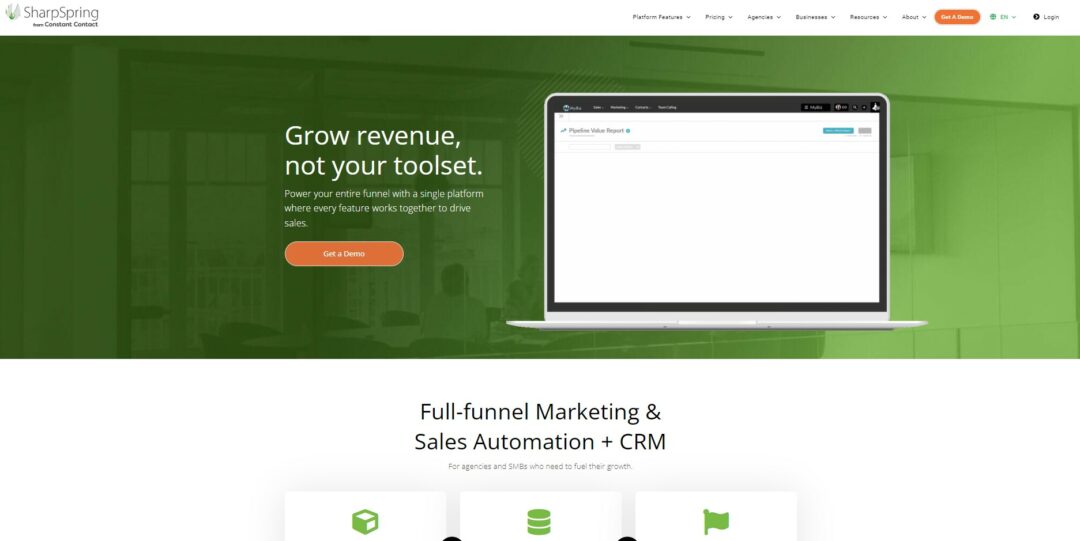
Pros:
- All-in-One Platform: SharpSpring provides a comprehensive suite of marketing automation tools, including email marketing, CRM, social media management, analytics, and more. This all-in-one approach simplifies marketing operations by centralizing key functionalities in a single platform.
- Affordability: Compared to some other marketing automation platforms, SharpSpring is often considered more affordable, making it an attractive option for small to mid-sized businesses with budget constraints. The platform’s pricing structure is transparent, with no hidden fees.
- Behavior-Based Email Automation: SharpSpring’s automation capabilities include behavior-based triggers, allowing businesses to send targeted and personalized emails based on user interactions and behaviors
- Lead Scoring and Segmentation: The platform incorporates robust lead scoring and segmentation features, enabling businesses to prioritize and categorize leads based on their engagement and behavior.
- Customizable Dashboards and Reporting: SharpSpring provides customizable dashboards and detailed reporting tools, offering insights into campaign performance, lead generation, and other key metrics.
- Agency-Friendly Features: SharpSpring caters to marketing agencies with features like multi-client management, allowing agencies to handle multiple clients within a single account.
Cons:
- Learning Curve: The platform offers a wide range of features, and while it provides extensive capabilities, some users may find it takes time to fully grasp all functionalities.
- User Interface Design: While opinions may vary, some users have provided feedback on the user interface design, stating that it might not be as intuitive or visually appealing as some competing platforms.
- Customer Support Response Time: A few users have mentioned concerns about the response time from SharpSpring’s customer support. Quick and efficient support is crucial in addressing any issues or queries, and some users have reported varying experiences in this regard.
- Limited Third-Party Integrations: While SharpSpring integrates with many popular tools, it may not have the same extensive list of integrations as some other marketing automation platforms.
Pricing:
Sharpspring’s pricing starts at $499 per month.
SharpSpring’s combination of affordability, user-friendly design, and comprehensive features positions it as a strong contender in the marketing automation space for many organizations.
7. GetResponse
GetResponse is an all-in-one marketing platform that caters to businesses of all sizes. With features such as email marketing, automation, and webinar hosting, it provides a comprehensive suite to execute multi-channel campaigns. Its intuitive drag-and-drop builder simplifies the creation of automated workflows.

Pros:
- All-in-One Solution: GetResponse provides a comprehensive suite of tools, including email marketing, automation, landing pages, webinars, and CRM. This all-in-one approach simplifies marketing management by consolidating various functionalities within a single platform.
- Conversion-Focused Landing Pages: GetResponse includes a landing page builder with templates optimized for conversions. Businesses can create customized landing pages to capture leads and drive specific actions, enhancing the effectiveness of their campaigns.
- Webinar Hosting: GetResponse stands out by offering integrated webinar hosting. This feature allows businesses to conduct webinars directly within the platform, fostering engagement and interaction with their audience.
- Scalability: GetResponse is suitable for businesses of various sizes, from small startups to large enterprises. The platform’s pricing plans and features are designed to scale with the growing needs of the business.
Cons:
- Learning Curve for Advanced Features: Some users may find that mastering the more advanced features of GetResponse, such as automation workflows and advanced segmentation, can take time.
- Template Limitations: While GetResponse offers a variety of email templates, some users may find the design customization options somewhat restrictive compared to other platforms.
- Contact Management Challenges: Some users have reported difficulties in efficiently organizing and categorizing contacts, especially when dealing with numerous segments.
- Pricing Structure for Larger Lists: As the subscriber list grows, the cost of using GetResponse can increase, which may pose challenges for businesses with larger contact databases
- Customer Support Response Time: Some users have reported longer response times from GetResponse’s customer support, particularly during peak periods. Businesses requiring swift resolution to issues may find this aspect to be a potential drawback.
Pricing:
GetResponse’s pricing starts at $19/month for up to 1,000 subscribers.
It’s important for businesses to assess their specific requirements and goals when choosing a marketing automation platform. GetResponse’s combination of diverse features, user-friendly interface, and responsive support make it a compelling choice for organizations looking to optimize their marketing efforts.
8. Oracle Eloqua
Oracle Eloqua, part of the Oracle Marketing Cloud, is an enterprise-level marketing automation platform. It offers advanced targeting, lead scoring, and campaign analytics. Eloqua’s integration capabilities ensure seamless connectivity with other business applications, providing a unified solution for large-scale marketing operations.
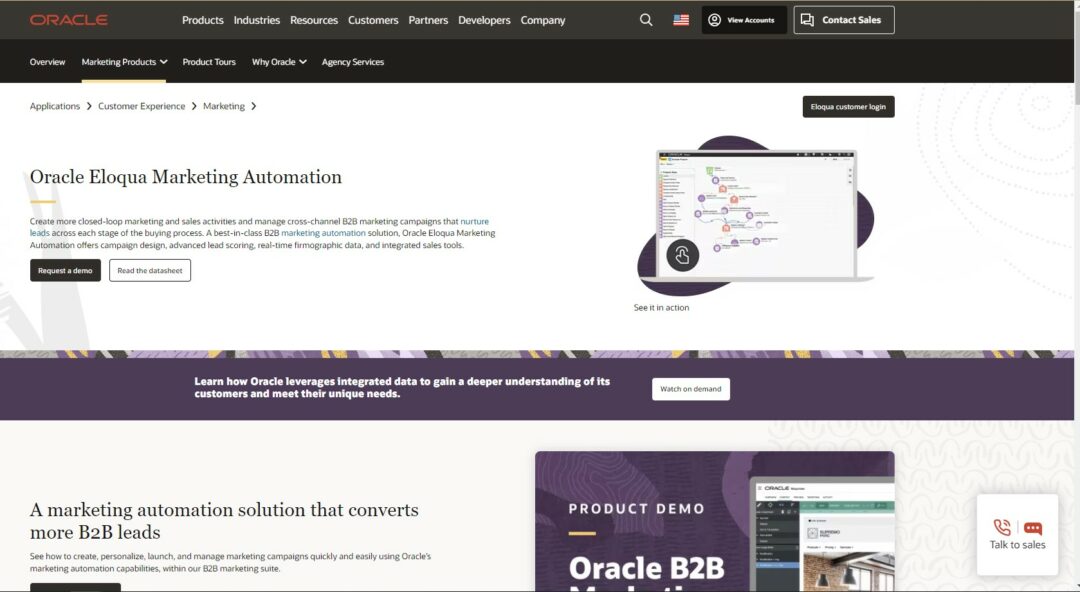
Pros:
- Advanced Lead Scoring: Oracle Eloqua provides robust lead scoring capabilities, allowing businesses to assign scores to leads based on their interactions and engagement. This helps prioritize leads, ensuring that sales teams focus on prospects with a higher likelihood of conversion.
- Multi-Channel Campaign Management: Eloqua excels in orchestrating multi-channel marketing campaigns. It enables businesses to create and manage campaigns across various channels, including email, social media, web, and mobile, ensuring a cohesive and integrated approach to customer engagement.
- Compliance and Security: Oracle places a strong emphasis on data security and compliance. Eloqua adheres to industry standards and regulations, providing businesses with confidence in the protection of sensitive customer data and ensuring compliance with privacy laws.
- Global Reach: For businesses with a global presence, Eloqua’s capabilities extend to managing and coordinating marketing activities on an international scale. This includes features such as multi-language support and regional customization.
Cons:
- Complex Implementation: Oracle Eloqua is known for its robust capabilities, but its implementation can be complex and may require a significant learning curve. Users, especially those new to marketing automation, might find the initial setup challenging and time-consuming.
- Higher Cost: Oracle Eloqua is typically positioned as an enterprise-level solution, and its pricing may be higher compared to some other marketing automation platforms. This cost can be a limiting factor for smaller businesses with budget constraints.
- Dependency on IT Support: Eloqua’s advanced features often necessitate involvement from IT teams for optimal utilization. This dependency on technical support can be a challenge for marketing teams that prefer a more self-sufficient approach.
- Limited Native Integrations: While Oracle Eloqua provides robust integration capabilities, some users have noted that certain integrations may require additional effort or customization. This can be a consideration for businesses relying on specific third-party tools.
Pricing:
Eloqua offers premium-only subscriptions, with a starting price of $2,000 per month.
Oracle Eloqua stands tall as an enterprise-level marketing automation platform, wielding a plethora of features and capabilities that empower businesses to orchestrate sophisticated marketing campaigns with precision.
In conclusion, choosing the right marketing automation platform is a pivotal decision for your business’s success in 2024. Consider your specific needs, budget, and scalability requirements when exploring these top platforms. With the right automation tools in place, you can elevate your marketing strategy, streamline operations, and drive sustainable growth in the dynamic digital landscape.
__ __





0 Comments